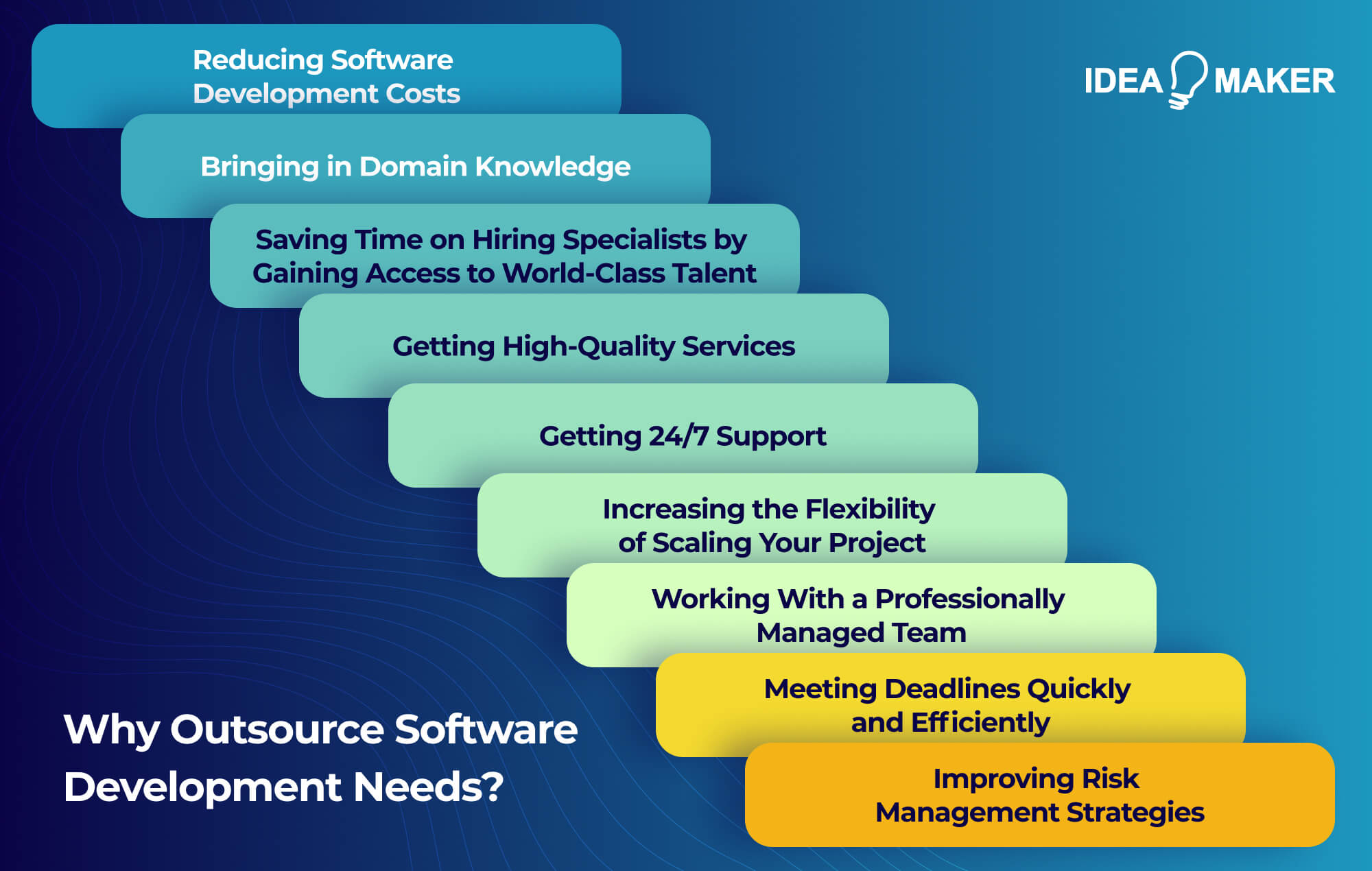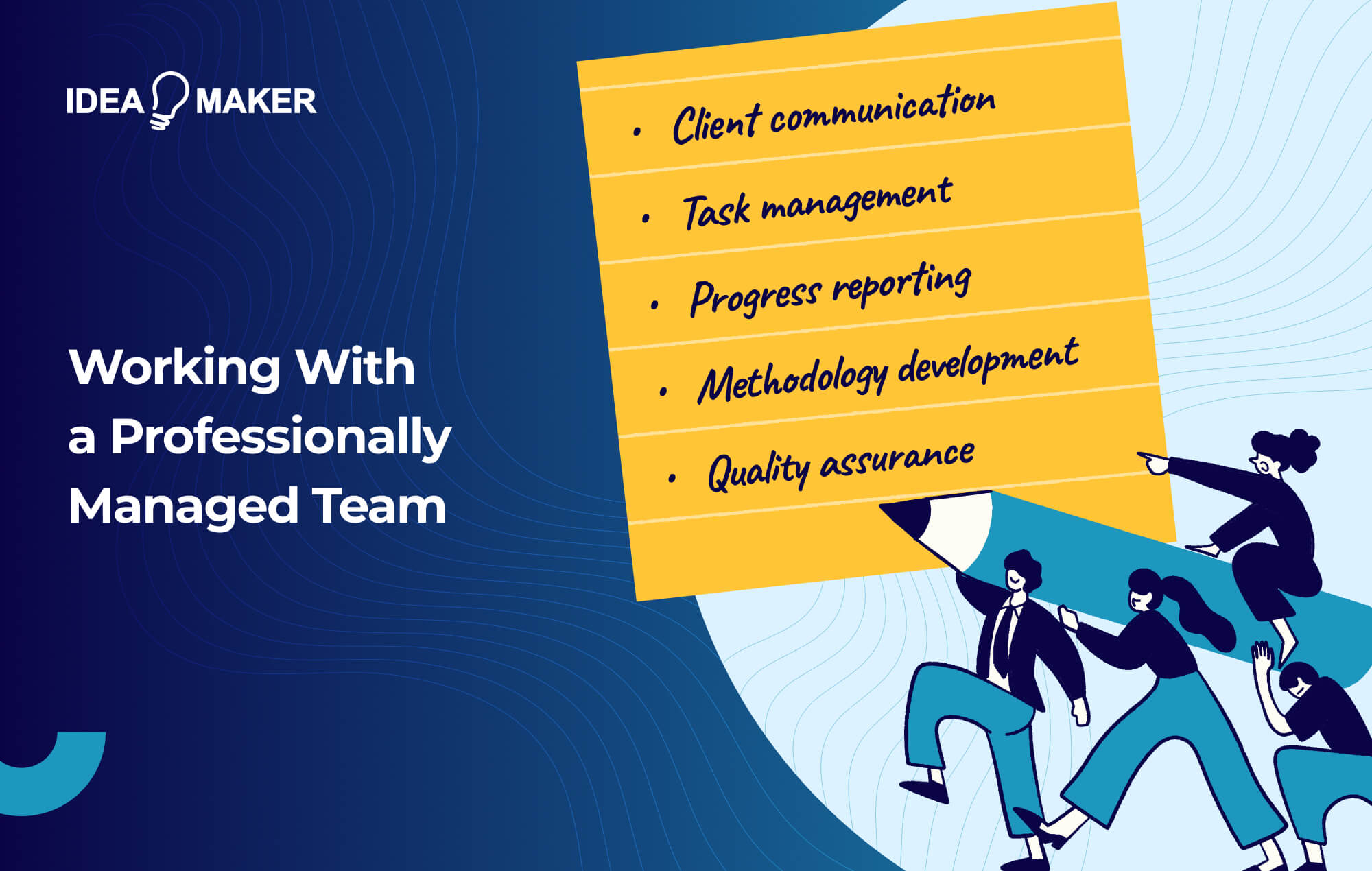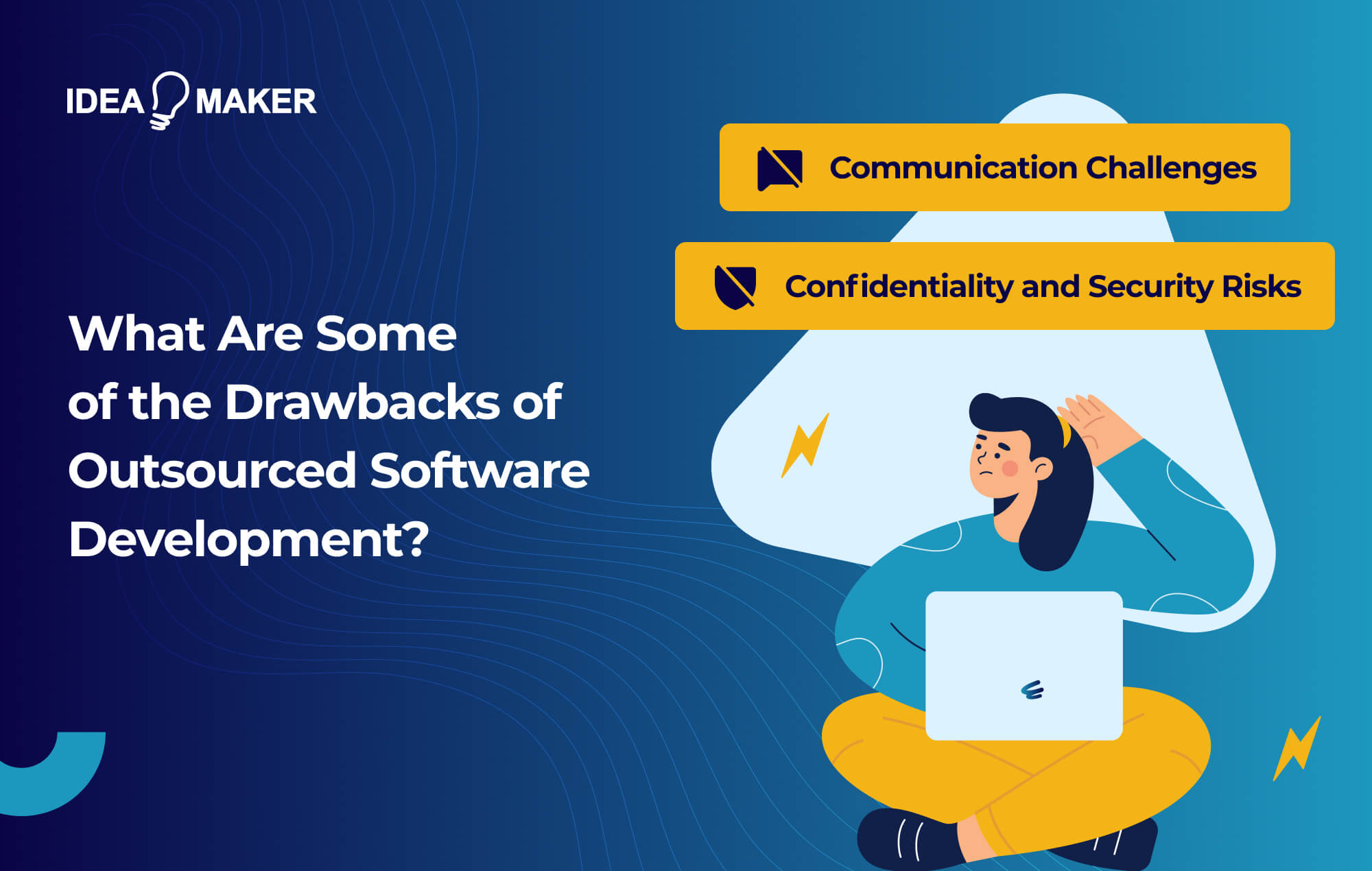Table of Contents
You have many choices when developing software for your business, one is to outsource software development instead of building your application in-house. Outsourcing software development is a popular choice for enterprises of all sizes, even those with in-house development teams. This is due to the many benefits that outsourcing provides, from cost-effective labor to better risk management. But why outsource software development? Primarily, it allows companies to focus on their core competencies while leveraging specialized expertise from external teams.
Of course, as with any business venture, some risks are involved, such as communication and security concerns. However, there are some simple solutions to these issues, and the benefits of outsourcing development outweigh the drawbacks. In this article, we explore both the benefits and disadvantages of outsourced software development.
What Is the Outsourcing of Software Development?
Software development outsourcing is the practice of hiring a third-party development agency to handle your project instead of building it in-house. Software development outsourcing is quickly growing in popularity, with an estimated $731 billion spent on outsourcing in 2023. This is thanks to the many benefits of outsourced software development (as discussed later in this article), and the available software development outsourcing models that fit all types of businesses. These models include:
- Dedicated Team: The dedicated team model is where you hire an entire team of third-party software developers to handle your project. You can hire a group of individual freelancers or, preferably, a software development agency.
- Extended Team: This is where you hire developers to fill a deficit of resources or skills. For example, if you have an in-house team but lack the skills of a React Native developer, you might decide to outsource that one team member.
Different pricing models may be applied to outsourced teams, such as:
- Fixed Price: A Fixed-price project refers to a development that is delivered for a one-time fee, usually following a strict scope.
- Time and Materials: This pricing model is where you only pay developers for the time they spend actively working on your project, as well as for the materials they use, such as software licenses.
Additionally, businesses looking to outsource their development projects face a choice between onshore, offshore, and nearshore outsource software development. While offshore typically offers more affordable development options, project quality could be better, making onshore or nearshore better options.
Why Outsource Software Development Needs?
There are many reasons why outsourcing software development is so popular among small and growing businesses. From reducing development costs to improved risk management, the advantages of outsourcing development helps to position businesses for long-term growth and success.
However, with challenges such as security and communication concerns, we understand that you might be hesitant to jump right in with outsourcing developers. As a result, we’ve outlined below the top reasons why businesses put their faith in outsourcing software development.
Reducing Software Development Costs
Software development can be expensive, especially when building complex enterprise-level applications. In fact, the average software development project costs between $60,000 – $150,000, making it a challenging decision. While the long-term benefits of software development may outweigh the initial investment costs, in-house development is out of reach for many businesses.
So, why is the cost so high? This is because, when building software using an in-house team, you have to pay for each developer’s yearly salary plus resources such as hardware and development software. When outsourcing software development, however, you reduce costs by paying for only the cost of the project , allowing for a more manageable custom software development budget.
What’s more, the hourly rate of a development agency will typically match that of one single developer. That means you get access to all the resources and skills of a fully-fitted in-house team without paying the high price of employing multiple full-time employees. For example, the average hourly rate of a software development company on Clutch.co is only $49.
Bringing in Domain Knowledge
When outsourcing software development, you get access to the software development agency’s industry knowledge. Therefore, outsourcing can be particularly useful when building niche products, whether in terms of industry or functionality. For example, if you wanted to build automation software for construction material ordering with an in-house team, you’d first need to create a team of individuals with experience in that field of expertise.
Recruiting a whole team for a niche job may prove challenging. However, software development agencies tend to specialize in certain development areas or industries, often providing bespoke development services tailored to specific needs. At the very least, their teams will contain all the developers you need, likely with some who have experience in your industry. Overall, the domain knowledge that outsourcing brings is a top reason businesses choose to outsource.
Saving Time on Hiring Specialists by Gaining Access to World-Class Talent
On average, it takes 35 days to hire a software engineer, from job listing to selecting a candidate and onboarding. Now, image you have to hire multiple software engineers to build your team–even if you hire them simultaneously, you’re going to have a hard time managing resources and getting everyone onboarded simultaneously. This could lead to a delayed project and poor communication, not to mention the cost of hiring multiple employees.
When outsourcing your software project to a development team, you avoid the arduous recruitment process. All you need to do is find the right software development company, and they’ll give you access to world-class talent without the lengthy recruitment process. However, when hiring a software development agency, there are several things to consider:
- Portfolio: By reviewing a software development team’s portfolio, you gain an understanding of the projects and industries in which they have experience. If they’re used to working in your industry, the chances are they have the right expertise.
- Expertise: What service lines do they offer? For example, if you’re looking to build a mobile application but see no evidence of experience in mobile apps, their development team possibly doesn’t have the right expertise for your project.
- Location: At the beginning of this article, we mentioned the possibility of offshoring, onshoring, and nearshoring. You should determine the development team’s location and consider whether the outsourcing model it requires is best for you. If you want high quality with fast communication, onshore will be your best option.
- Post-Release Support: When your development project comes to an end you shouldn’t break ties with your development team. It’s essential that you identify whether the team offers post-release support options to ensure your software is well-maintained.
Considering the above areas when outsourcing a development agency will help you to choose a company that suits your needs best. By doing so, you won’t need to worry about hiring developers again, as most teams are looking for long-term relationships.
Getting High-Quality Services
When working with an outsourced development agency, you can guarantee a certain level of quality and service. For example, consider the areas we outlined earlier when hiring a development team which will help ensure you receive quality service. However, to take it a step further, you can examine your prospective development company’s Clutch.co page or Google reviews.
When you outsource your software project to a development team with a proven track record of success, you can be certain of a high-quality service. This is thanks to the access to resources and expertise that you’re afforded, from first-class developers to highly experienced project managers. With an in-house team, on the other hand, you need experience managing software projects to ensure success; otherwise, you may find your project going off course.
Getting 24/7 Support
Outsourced software development teams often offer a service level agreement (SLA) where they agree to provide a certain level of customer service. Generally, you’ll have access to some form of 24/7 support. While this may not be direct access to customer support agents, automated systems can be set up to receive and process your issues, ensuring that you always have a way to request support. Additionally, these teams can include a dedicated development team focused solely on your project, enhancing the responsiveness and personalization of support.
For example, if you’re tinkering with your software late at night and notice a bug, you can submit a support ticket for the development team to handle. With an in-house team, on the other hand, you’d have to wait for normal working hours to resume. In other words, an outsourced software development team offers highly efficient customer support options.
Increasing the Flexibility of Scaling Your Project
When scaling your project with an in-house team, you’ll find yourself hiring new developers, investing in additional hardware, and upgrading server capacity. With an outsourced team, however, you enjoy greater flexibility when scaling your project without the hassle of increasing team size. For instance, you simply need to approach your development team with a new project scope, and they’ll determine what resources are required.
Working With a Professionally Managed Team
Working with an outsourced software development team means you get access to their management team and expertise. This means that you don’t have to worry about keeping the development team on track and can leave it in the hands of the outsourced team’s managers. Having a team manager experienced with software development is essential to keep the project on the right track.
For instance, an experienced software project manager will confidently ensure standards and processes are followed, ensuring the successful deployment of your software. Software project managers have several responsibilities, including:
- Client communication
- Task management
- Progress reporting
- Methodology development
- Quality assurance
By outsourcing your software development, you’re free to focus on the important daily operations of your business while your development team’s managers focus on your project. With experienced and highly focused attention on your project, it’s more likely to be a success than if you were to manage it while juggling other responsibilities.
Meeting Deadlines Quickly and Efficiently
Development agencies are experienced in working to strict deadlines and understand how to plan projects accordingly. In some cases, outsourced teams may even bring on additional labor to ensure the timely delivery of your project. This is because the ability to deliver software to a deadline is key to maintaining a positive reputation and so agencies will take all necessary measures l to satisfy their clients.
Additionally, development agencies have experience following standardized development procedures indicative of efficient development. For instance, many outsourced development companies will use the Agile methodology. Agile allows them to build features in iterations known as sprints, where they are built and tested before being implemented into the overall system. This saves time when it comes to testing later down the road, as bugs are less likely to slip through the cracks.
Improving Risk Management Strategies
Your business faces new risks on a daily basis, but as a business owner, you’re prepared–identifying potential risks and implementing mitigation strategies. This is an essential part of running a successful business, as 77% of companies have encountered unexpected risks in the past five years. No matter how experienced your team is, software development experiences the same issues.
Fortunately, with experience comes an understanding of software development risk mitigation strategies, allowing your outsourced team to identify and prepare for risks effectively. Generally, risk mitigation follows these steps:
- Risk identification
- Risk prioritization
- Mitigation strategy creation
- Solution implementation
So, when working with an outsourced software development team, you can rest assured that they work hard to identify and mitigate any critical risks.
What Are Some of the Drawbacks of Outsourced Software Development?
Nothing is perfect. While outsourcing your software development needs comes with many highly desirable benefits, there are some drawbacks to consider. Below, we’ve outlined some of the biggest concerns many businesses have when outsourcing software development and have provided some solutions.
Communication Challenges
A primary concern of businesses that outsource software development is communication. As your development team will not be working alongside you at your offices, you may feel that communication will be sluggish and ineffective. While this is certainly possible, as building your software to your exact specifications requires continuous conversation, collaboration, and clarification, there are many workarounds.
For instance, during the COVID-19 lockdowns, businesses quickly became accustomed to working from home, utilizing several communication and management tools. These tools, such as Slack, Zoom, and ClickUp, can still be utilized today, enabling you to stay in touch with your development team. The old methods still work though, as team members can send emails, and phone calls can be scheduled.
What’s more, with the possibility of an SLA in place, as discussed earlier, your developers will work hard to keep you in the loop.
Confidentiality and Security Risks
When working with an outsourced software team, depending on your project, it may be necessary to give them access to your internal software systems or hosting servers. Understandably, this causes confidentiality and security concerns for businesses. However, most companies, like us at Idea Maker, limit the amount of information they have access to by building software on servers that, ultimately, you have control over.
Additionally, if you’re concerned about security, hiring an onshore development company should alleviate many of your worries. This is because onshore companies are constrained by the same laws as your company. As a result, if a US-based development agency tried to steal your information and ideas, you could challenge them in a court of law. With offshore and nearshore agencies, you may run into issues.
Why You Should Outsource Your Projects to Idea Maker
If you’re looking to outsource your software development project and take advantage of the benefits listed above, you’re in the right place. At Idea Maker, we have a team of dedicated expert developers ready to bring your project to life. We have experience in a wide range of industries, from enterprise to aviation, and can provide several service lines such as SaaS development and mobile app development. What’s more, we’re a US company, so you can rest assured that we deliver high standards. Schedule a free consultation today to get started.

















